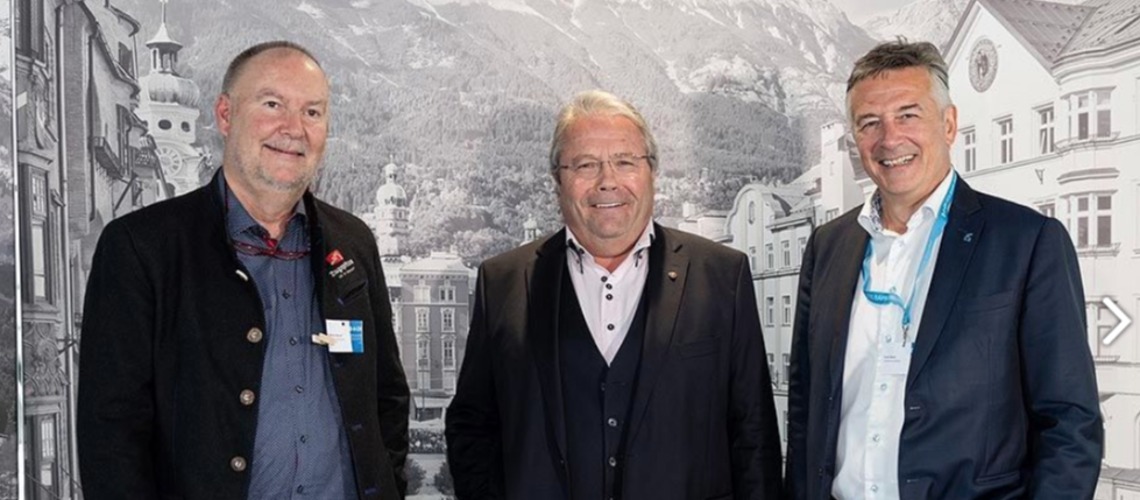DA-CH Conference: Liftco’s Tackle A Sustainable Future Together

At the DA-CH cable car conference 2022 in Innsbruck today, the top cable car representatives from Austria, Germany and Switzerland emphasized the enormous responsibility of the industry in the tourist and alpine regions. In particular, the corona pandemic and the current issues of the energy crisis, inflation and calls for savings have shown how quickly and effectively companies can react to changing conditions.
Especially in the current economically tense times, it is the task of cable car companies to ensure prosperity, especially in rural areas, with their activities. Because in addition to the employees who are employed directly by the cable cars, the industry provides a large number of other employment effects that radiate across all economic sectors. For Hans Wicki, President of Swiss Cable Cars, it is therefore clear: “Mountain railway companies are the economic drivers in the mountain areas. They generate jobs and thus offer prospects for the region. One franc of revenue for the mountain railway means six francs of revenue for the destination. In order for companies to continue to operate successfully, they need the necessary room for manoeuvre. Therefore it is important that we find the right balance between the idea of protection and use when it comes to environmental and spatial planning issues. We need sustainable solutions in dealing with nature and in dealing with the region.»
The Austrian cable cars have dealt intensively with all three dimensions of sustainability in an extensive strategy process. Currently, the ecological component in terms of sustainable resource consumption is at the center of public discussion. «Under the heading of saving energy, we are challenged to find appropriate answers. We are therefore working intensively with experts to determine further potential," says Franz Hörl, chairman of the cable car association in the Austrian Chamber of Commerce. Work is currently underway on a standardized CO2 footprint calculator for the industry. With this tool it should be possible to professionally monitor your own CO2 footprint, as well as to identify further savings potential and to take appropriate measures.
On the positive side, the Austrian cable cars have already been able to reduce their energy consumption by 20 percent based on the transport capacity due to forward-looking investments in recent years. Despite the high level of energy efficiency, the industry would like to continue examining all possibilities of reducing the energy requirement - without restricting the supply. "What many people forget: Our cable cars are almost 100 percent operated with domestic green electricity, with a few exceptions, fossil fuels are a thing of the past," emphasizes Hörl.
The cable cars are not only pioneers in terms of sustainable energy generation, but are also increasingly devoting themselves to the topic of mobility in order to be able to offer guests more alternative arrival and departure options together with mobility partners in the future.
For Hörl, these tasks are the only answer to making the industry fit for the future, creating trust and thus gaining a reputation. This is necessary in order to be able to reliably fulfill the role of cable cars in the years and decades to come. For Matthias Stauch, President of the Association of German Cable Cars, this lies above all in making an important contribution to creating a livable and inclusive world of work and leisure in many regions. “Cableways offer a wide range of jobs in a wide variety of areas for everyone. This prevents emigration and daily commuting, makes it easier to combine family and work, and promotes social life. «With us, structurally weak areas become strong and livable places to work and live. To work,
However, these on-site jobs are severely endangered by the prevailing shortage of skilled workers. According to the ifo Institute, almost 50% of German companies were already affected by this in July 2022. The Corona years have dramatically aggravated the situation again. In order to secure young talent here, the cable cars have been training employees for some time. On the one hand, they offer the younger generation attractive career prospects in their home country and, on the other hand, prevent future qualified employees from migrating from the regions.
In order to counteract the shortage of skilled workers, however, more support from politicians is necessary, and numerous official and bureaucratic hurdles continue to hinder companies. Matthias Stauch demands: "Politicians must finally recognize our performance as an attractive employer in tourism by supporting us fully and with commitment with pragmatic solutions."
He also emphasizes that the cable cars attach great importance to inclusion and are working on continuous improvement with far-reaching measures.
Hans Wicki, Franz Hörl and Matthias Stauch agree that sustainability is central to the industry and that they have to walk the path together.
The ropeway representatives at the DA-CH conference get inspiration for sustainable solutions by looking beyond their own noses into other regions and other sectors.














